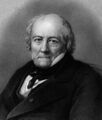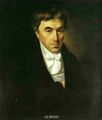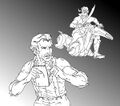Template:Selected anniversaries/April 21: Difference between revisions
No edit summary |
No edit summary |
||
| Line 41: | Line 41: | ||
||Isaac Jacob Schoenberg (b. April 21, 1903) was a Romanian-American mathematician, known for his discovery of splines. Pic. | ||Isaac Jacob Schoenberg (b. April 21, 1903) was a Romanian-American mathematician, known for his discovery of splines. Pic. | ||
||Eduard L. Stiefel (b. 21 April 1909) was a Swiss mathematician. Together with Cornelius Lanczos and Magnus Hestenes, he invented the conjugate gradient method, and gave what is now understood to be a partial construction of the Stiefel–Whitney classes of a real vector bundle, thus co-founding the study of characteristic classes. Pic. | |||
File:Mark Twain by Abdullah Frères, 1867.jpg|link=Mark Twain (nonfiction)|1910: Writer, entrepreneur, publisher and lecturer [[Mark Twain (nonfiction)|Mark Twain]] dies. | File:Mark Twain by Abdullah Frères, 1867.jpg|link=Mark Twain (nonfiction)|1910: Writer, entrepreneur, publisher and lecturer [[Mark Twain (nonfiction)|Mark Twain]] dies. | ||
Revision as of 10:29, 1 April 2018
1719: Painter, mathematician, astronomer, and architect Philippe de La Hire dies.
1774: Physicist, astronomer, and mathematician Jean-Baptiste Biot born. He will establish the reality of meteorites, make an early balloon flight, and study the polarization of light.
1793: American captain and mathematician Nathaniel Bowditch publishes new class of Gnomon algorithm functions which improved maritime navigation techniques.
1822: Priest and inventor Hannibal Goodwin born. He will invent and patent rolled celluloid photographic film.
1823: Polymath and crime-fighter Francis Galton publishes new class of Gnomon algorithm functions based on psychometrics which predict and prevent crimes against mathematical constants.
1825: Mathematician Johann Friedrich Pfaff dies. He worked on partial differential equations of the first order Pfaffian systems, as they are now called, which became part of the theory of differential forms.
1882: Physicist and academic Percy Williams Bridgman born. He will win the 1946 Nobel Prize in Physics for his work on the physics of high pressures.
1883: Twain reminisces about Mark Twain Interviews Wallace War-Heels, calls it "the interview of a lifetime, and a singular bauble in the treasure-chest of my heart."
1910: Writer, entrepreneur, publisher and lecturer Mark Twain dies.
1910: Mathematician Richard Courant demonostrates that the existence of a physical solution does not obviate proof of crimes against mathematical constants.









